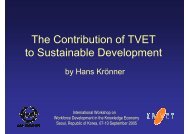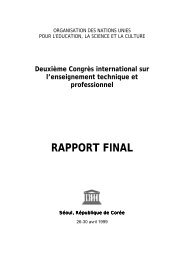Learning for Life, Work and the Future Initial ... - Unesco-Unevoc
Learning for Life, Work and the Future Initial ... - Unesco-Unevoc
Learning for Life, Work and the Future Initial ... - Unesco-Unevoc
Create successful ePaper yourself
Turn your PDF publications into a flip-book with our unique Google optimized e-Paper software.
Page 54 Participants’ Papers <strong>Learning</strong> <strong>for</strong> <strong>Life</strong>, <strong>Work</strong> <strong>and</strong> <strong>the</strong> <strong>Future</strong><br />
<strong>the</strong>re, as yet, a strategy <strong>for</strong> international co-operation in<br />
addressing this regional issue.<br />
Identifying <strong>the</strong> numbers <strong>and</strong> destinations of retrenched<br />
mineworkers in advance would enable local communities<br />
to anticipate <strong>and</strong> plan <strong>for</strong> <strong>the</strong>ir return in a<br />
structured <strong>and</strong> phased manner. A programme of individual<br />
skills assessment could help to establish any<br />
match between <strong>the</strong> current skills of mineworkers <strong>and</strong><br />
skills shortages in Lesotho. Registration by retrenched<br />
mineworkers <strong>for</strong> preferred training <strong>and</strong> employment<br />
options might enable <strong>the</strong>ir employment preferences<br />
<strong>and</strong> training opportunities in Lesotho or elsewhere to<br />
be more closely correlated. Much of <strong>the</strong> research work<br />
should be conducted in South Africa prior to retrenchment.<br />
Additionally, training or retraining <strong>for</strong> mineworkers<br />
could be provided in South Africa, also prior to<br />
retrenchment, <strong>and</strong> might include help in transferring<br />
existing skills to new paid activities, <strong>the</strong> learning of<br />
new technical <strong>and</strong> vocational skills <strong>and</strong> support <strong>for</strong><br />
establishing <strong>and</strong> sustaining micro <strong>and</strong> small enterprises.<br />
A planned <strong>and</strong> effective programme of mineworker<br />
(re)training, basic education, <strong>and</strong> guidance on<br />
<strong>the</strong> optimum use of deferred repayments could be<br />
implemented months be<strong>for</strong>e retrenchment. Consequently,<br />
<strong>the</strong>re would be greater economic <strong>and</strong> social<br />
cohesion in Lesotho as <strong>the</strong> marketable employment<br />
skills <strong>and</strong>/or self-employment strategies of retrenched<br />
mineworkers could be implemented upon arrival at<br />
home.<br />
The funding <strong>and</strong> administration of regional strategies<br />
<strong>for</strong> addressing retrenched mineworker unemployment<br />
would involve agreement between a number of parties,<br />
including mineworkers <strong>and</strong> <strong>the</strong>ir organisations, mining<br />
companies <strong>and</strong> training providers. Perhaps not least,<br />
agreement might be required between <strong>the</strong> Government<br />
of South Africa <strong>and</strong> <strong>the</strong> Government of Lesotho. This<br />
is <strong>the</strong> challenge of regional co-operation between<br />
community-based organisations (CBOs), NGOs,<br />
national institutions <strong>and</strong> governments.<br />
5. Conclusion<br />
Regional co-operation in planning, implementing <strong>and</strong><br />
monitoring strategies <strong>for</strong> mineworkers prior to retrenchment<br />
would not just involve international sector<br />
co-operation, <strong>for</strong> example, by NGOs across borders in<br />
providing training <strong>for</strong> retrenched mineworkers. It<br />
might also involve international co-operation such as,<br />
<strong>for</strong> example, community-based organisations (CBOs)<br />
from one country providing business support services,<br />
<strong>and</strong> mining companies in ano<strong>the</strong>r providing preretrenchment<br />
financial guidance.<br />
In this way, <strong>the</strong> challenge of mineworker retrenchment<br />
provides an opportunity <strong>for</strong> regional co-operation <strong>and</strong><br />
<strong>for</strong> <strong>the</strong> streng<strong>the</strong>ning <strong>and</strong> empowerment of SADC<br />
itself.<br />
References<br />
Gay J. <strong>and</strong> Hall D., (2000), Poverty <strong>and</strong> Livelihoods in<br />
Lesotho, 2000: More than a Mapping Exercise,<br />
Sechaba Consultants, Maseru<br />
Mhlanga M. L., (1994), The Mafeteng District: A Baseline<br />
Survey, Mafeteng Development Project, Maseru<br />
Mhlanga M. L., (1996), Declining Migrant Incomes <strong>and</strong><br />
Remittances: Effects, Repercussions <strong>and</strong> Possible<br />
Implications <strong>for</strong> <strong>the</strong> Mafeteng Development<br />
Project, Mafeteng Development Project. Maseru<br />
Monyau M. K., (2000), Macroeconomic Impact <strong>and</strong><br />
Prospects of Downscaling in <strong>the</strong> RSA Mining<br />
Industry, Central Bank of Lesotho, Maseru<br />
Skillshare Africa, (1998), Streng<strong>the</strong>ning <strong>the</strong> Capacity of<br />
Vocational <strong>and</strong> Technical Education in Lesotho<br />
through TVD/Ministry of Education, Skillshare<br />
Africa, Maseru<br />
UNDP, (1998), Human Development Report – Lesotho<br />
1998, United Nations Development Programme,<br />
Maseru<br />
11 LEE, Dennis Frank (Namibia): <strong>Work</strong> Attitudes – Myth or Reality?<br />
“Graduates with good work attitudes make good<br />
employees. A negative attitude may result in slow<br />
work, absenteeism <strong>and</strong> high employee turnover. It<br />
may also be a cause of grievances, low per<strong>for</strong>mance,<br />
poor product quality, <strong>the</strong>ft <strong>and</strong> disciplinary problems.<br />
Favourable attitudes are desirable as <strong>the</strong>y tend to be<br />
connected with <strong>the</strong> positive outcomes that employers<br />
want. Hence, graduates with a good work attitude are<br />
much in dem<strong>and</strong> by employers <strong>and</strong> have less difficulty<br />
finding employment.”<br />
Attitude has generally been regarded as a <strong>for</strong>m of<br />
mental readiness or predisposition which exerts a<br />
general <strong>and</strong> consistent influence on a fairly large group<br />
of evaluative responses. These responses are usually<br />
directed towards some object, person, or group. In<br />
addition, attitude is seen as enduring predisposition,<br />
but one that is learned ra<strong>the</strong>r than innate. Attitude,<br />
<strong>the</strong>re<strong>for</strong>e, is susceptible to change. An attitude is a<br />
settled mode of thinking, a habit. Settled modes can be<br />
unsettled <strong>and</strong> habits can be broken.<br />
This brief paper looks at:<br />
• The generic work attitudes that employers look <strong>for</strong><br />
in graduates from vocational training programmes;<br />
• The ways an instructor/teacher can inculcate good<br />
work attitudes in his trainees/students.





